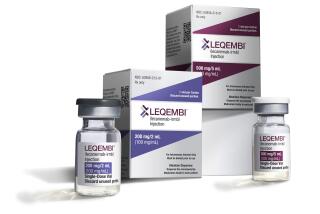Panel Backs Biogen Drug
- Share via
WASHINGTON — An advisory panel on Wednesday unanimously recommended that the Food and Drug Administration allow an effective but risky multiple sclerosis drug back on the market.
The committee proposed restrictions on the use of the drug, called Tysabri, and the creation of an elaborate system to monitor patients for signs of a rare brain infection that can occur as a side effect.
The panel’s recommendation, which is expected to be adopted by the agency, was good news for Tysabri’s makers, Biogen Idec Inc. of Cambridge, Mass., and Elan Corp. of Ireland.
Trading in both companies’ stocks had been halted Tuesday pending the committee’s action, but after news of the recommendation Biogen Idec shares rose more than 8% in after-hours trading. Elan’s U.S.-listed shares were up nearly 25% during market hours.
The manufacturers said 100,000 U.S. patients might be interested in taking the medication, which is administered in monthly intravenous infusions and costs an estimated $23,500 a year.
Based on early data, Tysabri is about twice as effective in treating MS as drugs currently on the market, but its long-term risks and benefits remain unknown. Scientists at the National Institutes of Health have determined that patients who take the drug have about a 1-in-1,000 chance of developing progressive multifocal leukoencephalopathy, or PML.
“It is likely there will be cases of PML and likely we are going to see deaths,” said the advisory panel’s chairman, Dr. Karl Kieburtz, a neurology professor at the University of Rochester in New York. “Is there a reasonable balance that physicians and patients can reach together? The answer is yes, with some restrictions.”
The 12-0 vote occurred a little more than a year after the medication was pulled from the market by its manufacturers after three people taking Tysabri developed PML. Two died.
Multiple sclerosis is a disease in which the immune system turns on the body, attacking the protective coating of nerves in the brain and spinal cord.
Tysabri, the first new MS drug in 10 years, is thought to work by preventing certain immune cells from damaging those parts of the nervous system, thus preventing recurring bouts of debilitating symptoms.
But FDA staff doctors said it might also block other immune cells from reaching infections in the nervous system, leaving patients vulnerable. Research has shown that many people carry the virus that causes PML, which is normally kept in check by the immune system.
Biogen’s top physician, Dr. Burt A. Adelman, said the company and the FDA had designed a monitoring program aimed at keeping the incidence of PML to a minimum. Separately, the company pledged to seek ways to treat the infection or mitigate its effects.
The company hopes to reintroduce the drug as soon as it works out details of the monitoring program with the FDA -- a matter of weeks, not months, Adelman said.
Anticipating formal FDA approval, investors drove Biogen Idec shares up $3.70 to $49.20 in after-hours trading Wednesday. U.S.-listed shares of Elan rose $2.70 to $15.80.
The monitoring program requires Tysabri to carry the FDA’s strongest possible warning. In addition, patients on other medications that suppress the immune system will not be able to take Tysabri at the same time.
Patients and doctors will have to register with the manufacturers to use Tysabri and will be required to sign statements confirming that they understand the risks involved. Patients also will have to be regularly monitored for symptoms of PML, which can resemble those of worsening MS. Information from the monitoring program will be shared with the FDA.
Several panel members unsuccessfully called for additional limits on the drug. One proposed that Tysabri be restricted to patients who have tried currently available drugs but received little or no benefit from them.
However, the voting members of the panel split on the question and determined by a 7-5 majority to leave the decision to doctors and patients. The FDA could still impose such a requirement.
It is rare for a drug that was withdrawn for safety reasons to return to the marketplace, but FDA officials said such reversals had occurred before. They cited Lotronex, a drug for irritable bowel syndrome that was withdrawn in 2000 after it was linked to bowel damage and deaths and returned to sale two years later.
More to Read
Inside the business of entertainment
The Wide Shot brings you news, analysis and insights on everything from streaming wars to production — and what it all means for the future.
You may occasionally receive promotional content from the Los Angeles Times.










